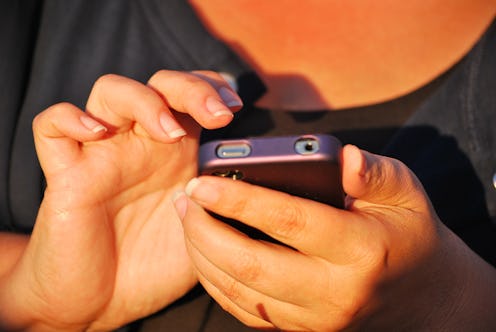
There's a iPhone app that wants to change the way you have sex. We-Consent is a sexual consent app that allows people engaging in sex with one another to take a video screenshot of themselves giving explicit verbal consent. A follow-up to the app called What About No, which records someone watching a video that says no, We-Consent asks its users for their name and the name of the intended partner (it seems so far that this app caters to sexual encounters of only two people); then, the original user points his or her camera at their intended partner and says either "yes" or "no" to the advances, thus recording whether or not you've given your consent. It's a noble idea, to be sure — but can We-Consent really prevent sexual assault and rape? Can any app, for that matter?
There are a variety of consent apps out there, and all of them offer variations on the same idea. Good2Go made waves last year with its system meant to let parkers mark their level of intoxication as well as whether they're ready to have sex; the first version of the app was shut down in October, but according to the app's website, its developers are hard at work on version 2.0. Another options is Circle of 6, which lets your friends know where you are in case you're in trouble, during a sexual encounter or otherwise. But do these apps actually work?
I'll be honest: My initial reaction to hearing about consent apps is skepticism. While any tool that encourages consent can be useful and shouldn't be undermined, I strongly feel communication about sex should take place face-to-face, not using a form of communication that hides behind a cell phone screen. It's also important to note that some of these apps, Good2Go being one of them, don't have super user-friendly interfaces and if someone needs to access them hastily, they won't be of much use. Not everyone always has access to a smartphone; furthermore, although smartphones can be useful for many things, they're not always the solution for threatening situations.
But Nancy Schwartzman, the creator of Circle of 6 makes a good point Speaking to NPR, she noted that even if the apps aren't significantly decreasing assault, they are offering college students and other people who use them resources for handing sexual assault and rape in the wake of such events. So while using these apps doesn't necessarily mean everyone will always go about sex with consent in mind, they do offer educational tools for those who might need them.
It's interesting to note that We-Consent's recordings aren't saved to your phone. They're encrypted and stored in a cloud, at which point they're only accessible if someone needs to disclose them to law enforcement, university personnel, or court officials. The encryption takes less than 20 seconds to make, yet lasts for seven years. You can see a demo of the app here, which shows two people using it as if they are just about to have sex, and another demo here, which is more of a tutorial to show how the app is used.
For now, though, we still need to work on pushing consent culture starting at a very young age, both in classrooms and out, as well as taking sexual assault education on college campuses seriously. While smartphone apps can be an auxiliary to the cause, they're certainly not a one-size-fits-all solution.